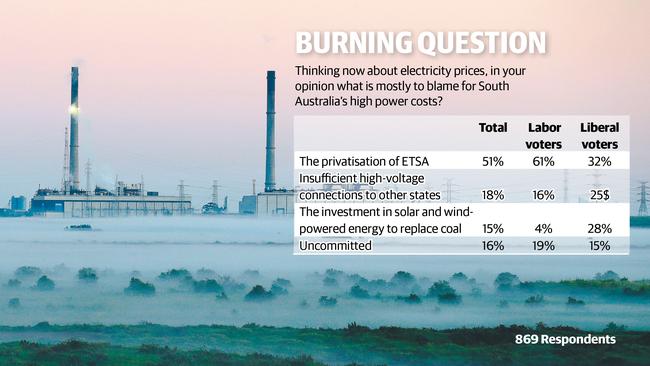Poll finds we blame ETSA sale for high SA power prices
EXCLUSIVE: Simmering public anger at ETSA’s long-ago privatisation is revealed as the major source of public blame for soaring power prices in an exclusive Advertiser poll. ANALYSIS
SA News
Don't miss out on the headlines from SA News. Followed categories will be added to My News.
- Revival plan for mothballed power plant
- You’re spending up to $1000 too much on power
- Energy price rose as Port Augusta power station closed
- Firm’s $500k power grant eroded by skyrocketing bills
SIMMERING public anger at ETSA’s long-ago privatisation is revealed as the major source of public blame for soaring power prices in an exclusive Advertiser poll.
In an extraordinary finding, 51 per cent of respondents said the 17-year-old sell-off of the state-owned power company by the then Liberal government was the key reason behind the state’s electricity crisis.
Only 15 per cent blamed investment in renewable energy to replace coal, a significant factor in Port Augusta power station’s closure in May at the cost of more than 180 jobs.
The exclusive Galaxy poll of 869 respondents also revealed only 18 per cent blamed high power prices on insufficient high-voltage connections to other states, which Energy Minister Tom Koutsantonis has declared makes the state vulnerable to spot market price spikes.
Mr Koutsantonis in July was forced to plead with Pelican Point power station operators to generate more electricity to avert a shutdown by some of the state’s biggest employers, partly blamed on a downturn in wind-powered generation during severe storms.
The lingering resentment at ETSA Utilities’ sale in 1999 to the Hong Kong-based Cheung Kong Group and sell-off of retail, transmission and generation arms blunts a key Liberal cost-of-living campaign ahead of the 2018 state election, just 18 months away.

The Liberals, in Opposition since 2002, have tried to sheet home blame to Labor’s “foolish headlong rush to wind power without storage” for surging spot market prices.
As of July, spot market prices had risen 280 per cent in a year to $279.50 per megawatt hour.
A report from Deloitte Access Economics has also warned that household prices will spike over the next two years, and blackouts will become more common, due to SA’s high level of green energy.
But Labor continues to seize upon ETSA’s privatisation, which Mr Koutsantonis this month said had left the state at the mercy of a small group of electricity generators because the previous Liberal government had sold the state’s electricity assets to monopolies.
The Advertiser/Galaxy poll reveals this tactic is likely to have strong electoral appeal and will prove difficult for the Liberals to counter, despite the $3.5 billion ETSA sale retiring just under half of the collapsed State Bank’s debt.
The then Liberal premier John Olsen in December 1999 argued the high-risk electricity industry had substantial exposure to taxpayers, like the State Bank, and he was intent on ensuring South Australians were never again shackled by severe debt levels.
The electricity utility sell-off was even ranked by Liberal supporters who responded to the poll as the chief reason for high prices, with 32 per cent blaming ETSA’s sale compared with 28 per cent attributing the cost increase to investment in solar and wind-powered energy to replace coal.
A further 25 per cent of Liberal supporters blamed insufficient high-voltage connections to other states.
Almost two-thirds of Labor supporters 61 per cent blamed ETSA’s sell-off, further indicating the fertile political ground for Premier Jay Weatherill’s anti-privatisation stance.
Labor supporters also strongly backed the state’s world-leading renewable energy push, with only four per cent blaming this for surging power prices.
However, only 16 per cent of Labor supporters were concerned about interstate high-voltage connections, which Mr Koutsantonis is pushing to better link SA to the national market and bring in cheaper power.
Long memories of a costly decision
Analysis — Paul Starick
WAY back in 1999, smartphones were a far-off dream, the Adelaide Crows were unsuccessfully chasing three consecutive AFL premierships and the world was needlessly fretting about the millennium bug wrecking computer networks.
South Australian political debate was dominated by the sale of electricity utility ETSA — finalised just before Christmas.
An Advertiser/Galaxy poll today reveals that simmering resentment remains at ETSA’s privatisation, judged by the public to be the chief culprit for current soaring power prices.
Given the extraordinary pace of change since then, the result dramatically shows the public’s elephantine memory for decisions which, rightly or wrongly, are believed to sting the cost of living.
It is perhaps more remarkable given politicians, in particular, whine about shrinking public attention spans during the new 24-hour media cycle. ETSA’s sale, the Liberal government of the time argued, would free SA from the shackles of crippling debt caused by the 1991 State Bank financial disaster which occurred, ironically, when Labor held power.
It would also, then Premier John Olsen argued, remove the financial risk of state-owned utilities participating in the relatively new national electricity market.
Labor, in power since 2002, has remained steadfastly anti-privatisation. Successive ministers have stoked anger at ETSA’s sale with — this poll suggests — considerable success.
During the past 14 years of Labor rule, toll roads have been off limits, despite being commonplace across the globe.
SA Water has remained a sacred cow in state hands.
This poll result shows the political advantage of these positions and why privatisation, under this state Labor regime, will remain a dirty word.


